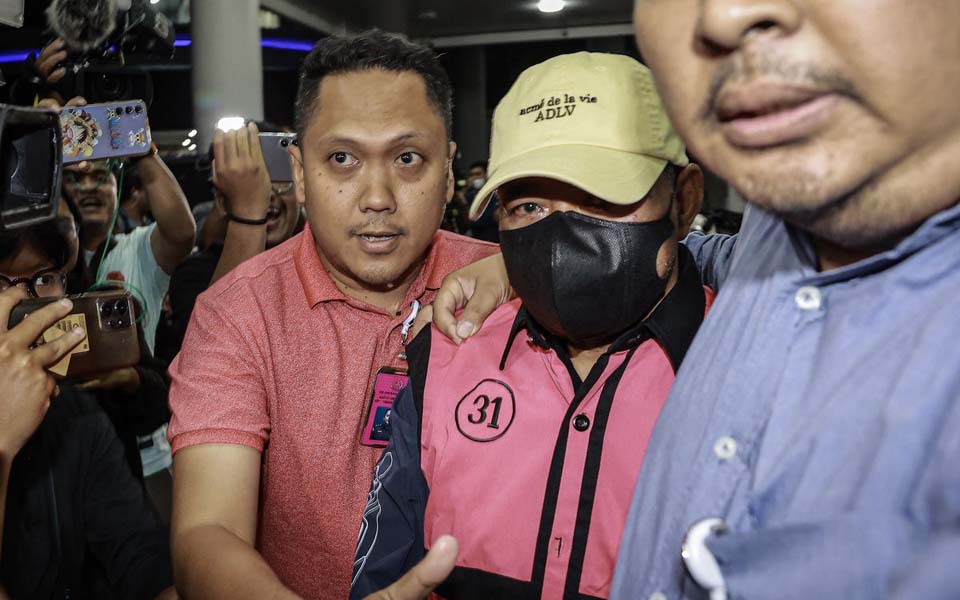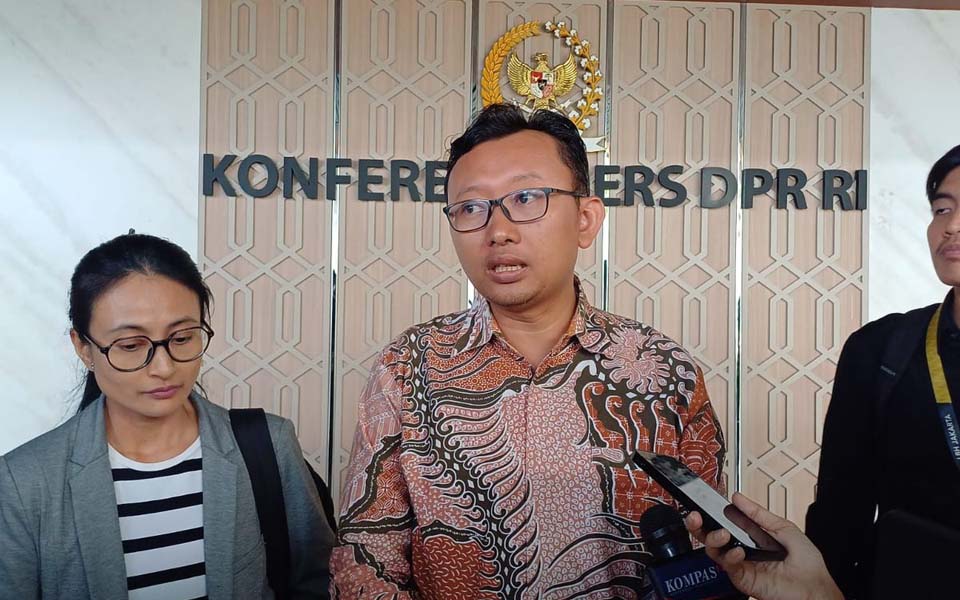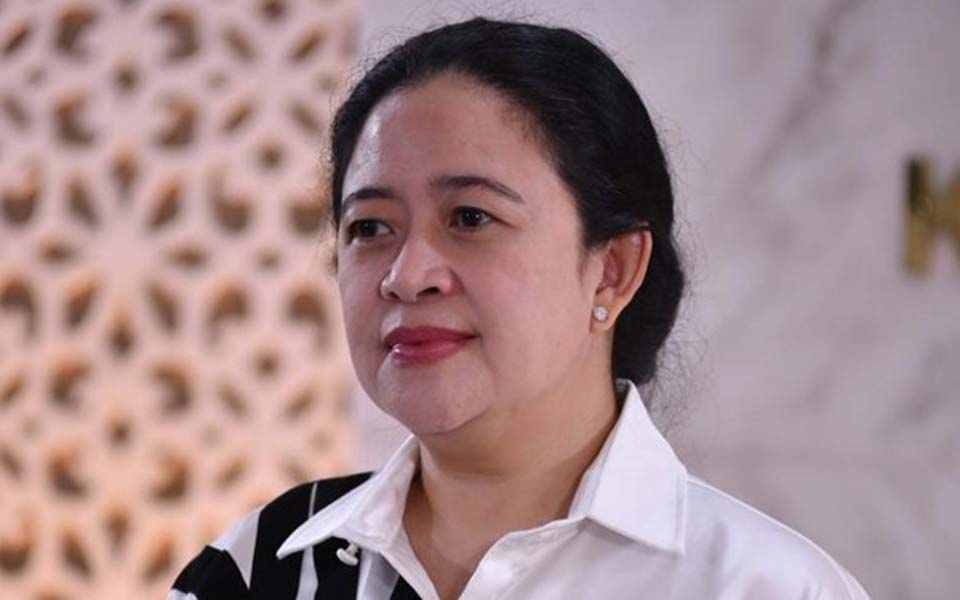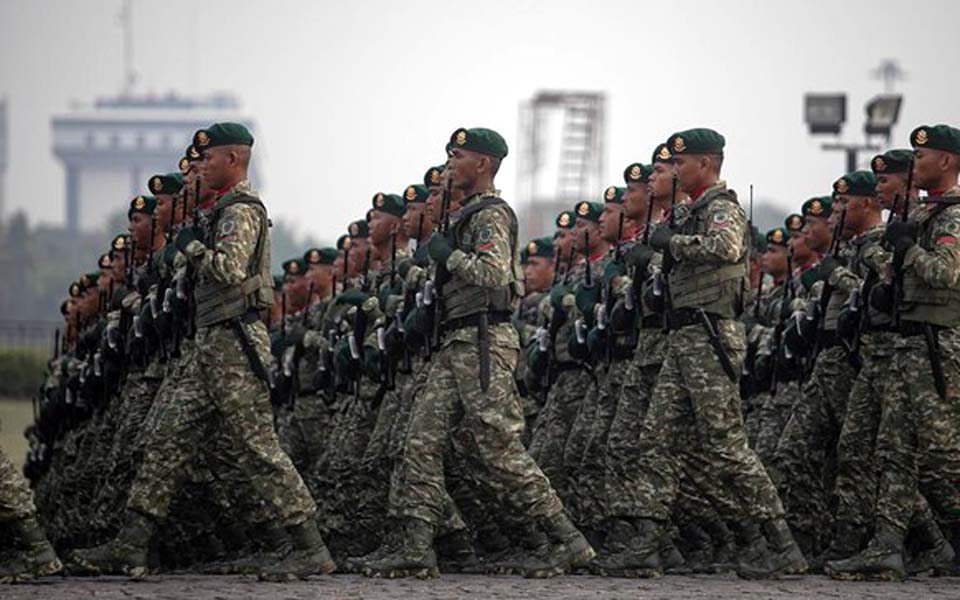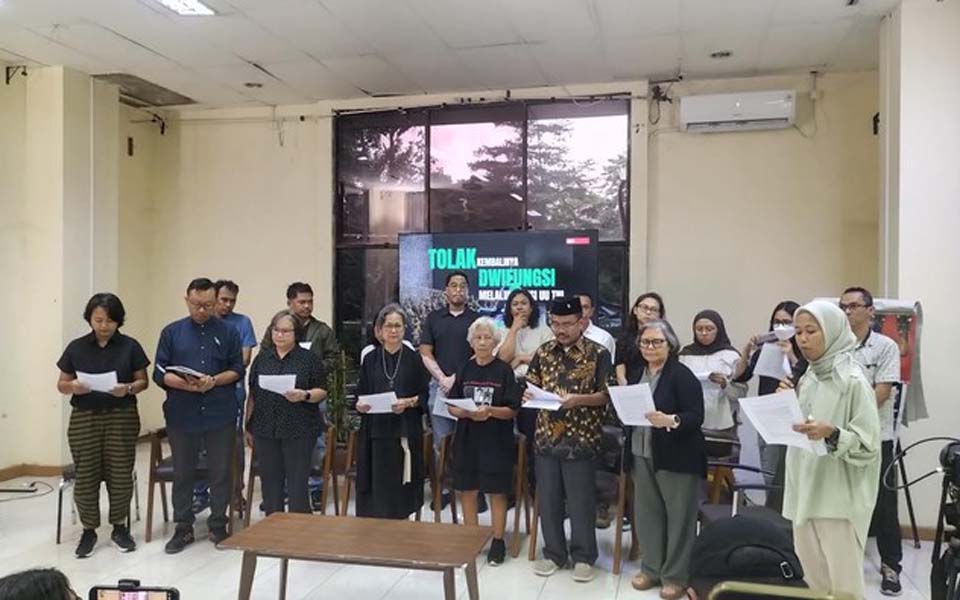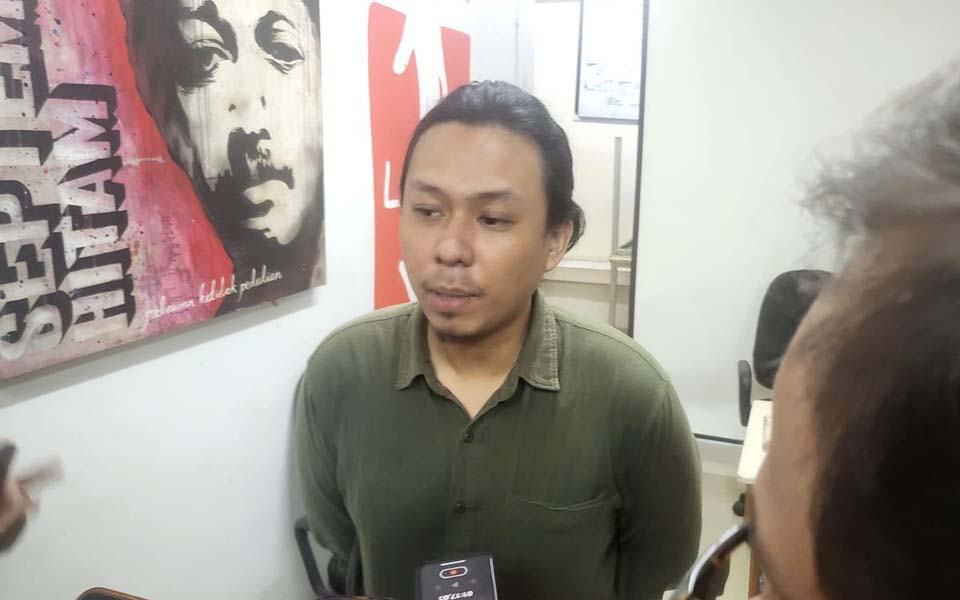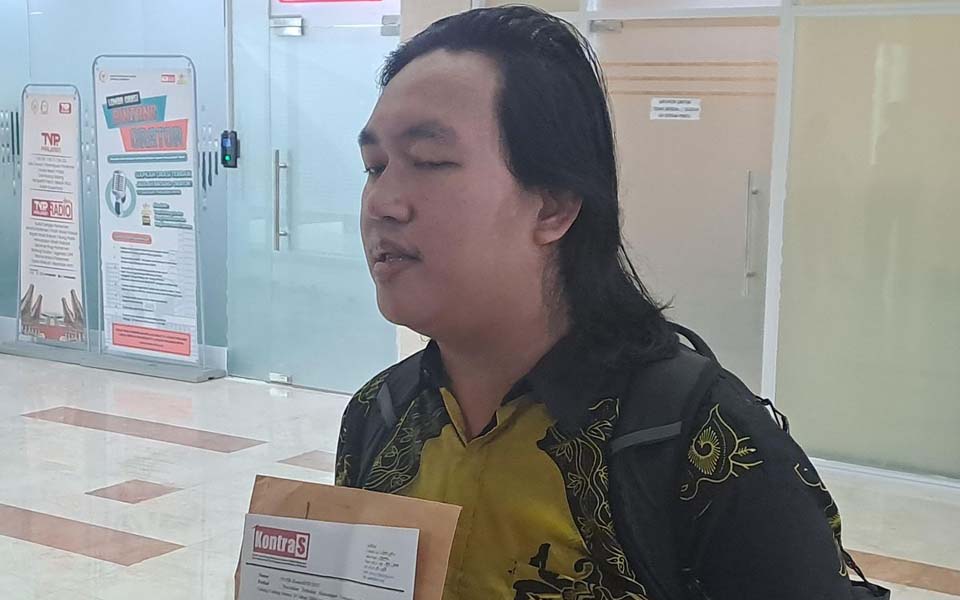Leon Kastayudha – The Draft Criminal Code (RKUHP) initiated by bourgeois politicians contains a series of problematic regulations which in essence legalise despotism and at the same time facilitate the extension of capitalist exploitation – the very thing that was the main target of the Reform Corrupted (Reformasi Dikorupsi) movement in 2019.
On Thursday August 27, the regime through Deputy Justice and Human Rights Minister Eddy Omar Sharif Hiariej argued that "The RKUHP is one of the efforts by the government to put together a re-codification of the system national criminal law with the aim of replacing the old Criminal Code which is a legal product of the Dutch East Indies colonial administration era".
He furthermore claimed that the RKUHP will at the same time modernise criminal law. These arguments and claims are untrue.
The fact is the RKUHP has actually adopted the articles on insulting the head of state from the Dutch East Indies criminal code which prohibited indigenous people from insulting the Dutch queen by criminalising anyone who is deemed to have insulted the president or vice president. The spirit of the law is exactly the same, using the label of defamation to silence and criminalise any form of criticism or resistance against those in power. Yet these very same articles were revoked in 2006 by the Constitutional Court.
Indeed, the authorities and supporters of the regime have the ambition of criminalising their opponents, especially those from activist groups. One of the methods used against activists from the Reform Corrupted movement, the Motion of No Confidence (Mosi Tidak Percaya) movement and the anti-Omnibus Law movement, was to silence critics and demonstrators by labeling them as insulting the state. This method has also been used to remove critical murals, especially those that depict the face of President Joko "Jokowi" Widodo. The regime is aware that the legal grounds for this are not strong enough, so the method the regime chooses is to revive the articles on insulting the head of state.
This is also reinforced and extended by articles on crimes against public authorities and state institutions through Article 351 paragraph (1) and (2) and Article 352 Paragraph (1).
So if the public is upset with widespread corruption by legislative members or the poor performance of the law enforcement agencies and then criticise them any way, they can be criminalised. Likewise, anger conveyed publically, such as in form of the recent memes over speed hump accidents, when huge amounts of netizens' data is leaked and traded, the hashtag "it's pointless reporting it to the police", or humorous and critical posters about the House of Representatives (DPR) at the Reform Corrupted actions, could also be criminalised.
In the same spirit, Articles 232 and 233 criminalise efforts to obstruct the organisation of a meeting by a legislative institution or government body. These articles clearly target the people's movement which has tried to resist despotism being legalised through repressive policies and regulations. Movements such as Reform Corrupted, Motion of no Confidence, the anti-Omnibus Law demonstrations, rallies calling for the enactment of the Draft Law on the Elimination of Sexual Violence and those opposing the RKUHP, are all in the firing line of Articles 232 and 233.
It also criminalises tactics such as strikes, blockades, pickets and occupations. Moreover it is complemented by the stipulations on the forced entry into a government office under Article 260 (1) and (2). Under Paragraph (2) it also covers those who force their way in by damaging property or climbing.
Learning from the waves of earlier action where the mass of demonstrators in several regions managed to break down fences and even occupy (temporarily) government buildings, the regime is trying to prevent this from being repeated, even though this further shows the regime's hypocrisy given that these building are paid for the people's taxes yet the people are refused entry.
Efforts to criminalise the movement are strengthened by other articles. First, Article 256 on organising parades, protest actions or demonstrations. Second, Articles 246 and 247 on the crime of incitement to resist public authority. And third, Article 256 which requires lodging a prior notification of a demonstration with the police. This is problematic because some protests are spontaneous or unplanned or are in response to abuse that demand actions occur all of a sudden. Conversely there have been many cases where bourgeoisie politicians have enacted harmful regulations or laws out of the blue.
This does not yet include cases where the police refuse to accept a notification so they have a pretext to break up a demonstration. Then in the elucidation sections of Articles 246 and 247 there is absolutely no explanation of what is meant by violence. So attempts to deal with or extinguish teargas as well as efforts to defend oneself, let alone fight back against violence and brutality by the authorities, can also be labeled as 'violence". In this way the regime is clearly trying to criminalise and destroy the people's resistance so that the agenda of exploitation and justification for their exploitation can proceed smoothly.
Remember also that all of this is accompanied by the fact that the RKUHP contains punishments for corruption which are lighter then the Anti-Corruption Law (Tipikor Law). Article 604 on illegally enriching oneself sets a minimum prison sentence of two years, while the same crime under the Tipikor Law is subject to a minimum prison sentence of four years. Similarly, minimum fines are reduced from 200 million rupiah in the Tipikor Law to 10 million rupiah in the RKUHP.
Then there is the article on the crime of the misuse of authority or position in the RKUHP which also reduces the minimum fine from 50 million rupiah under the Tipikor Law to 10 million rupiah. Then state civil servants who accept bribes by misusing their power, which under the Tipikor Law is subject to a maximum sentence of five years in prison, is reduced under Article 610 (2) of the RKUHP to a maximum of four years. The fine is also reduced from 250 million rupiah to 200 million rupiah.
Claims that the RKUHP will abolish the relics of colonial law are also contradicted by the articles on homelessness or vagrancy. Under Article 431 vagrancy is subject to a maximum fine of 1 million rupiah. Yet this is a relic of the Dutch East Indies regime which labeled vagrants as people who are of no use because of wrongs committed during their life. In general, this can even be categorised as a stipulation which criminalises poverty, such as regulations which prohibit begging, criminalise giving money to beggars, bylaws which criminalise "silver people" to regulations on housing complexes that prohibit buskers and scavengers from entering.
The criminalisation of poverty is also contained in the articles on disruptions to land, seeds, gardens and yards. The reality is that many poor people raise livestock in order to augment their income, such as keeping chickens which occasionally escape from their cages looking for food. Unlike large-scale livestock owners, they are not able to buy large amounts of land or abundant feed. Instead of being criminalised, conflicts related to livestock should be mediated, not prevented, by prioritising a social or even communal approach.
The argument that the RKUHP brings the law into line with social developments or modernisation is also not in accordance with reality. Modernisation is the advance of a social order which at the very least should involve scientific knowledge, a spirit of enlightenment, secularisation or the separation of religion and the state, the formation of a nation state, professionalism and the utilisation of technology, as well as industrialisation. The RKUHP however, instead of supporting secularisation instead still interferes in matters of religion and even criminalises actions which are deemed to be religious blasphemy.
Other problematic articles in the RKUHP are, for example, those related to the living law or what is claimed to be an acknowledgement of customary law and traditional rights which exist in society. So a person can be prosecuted even though they did not violate an article in the Criminal Code or a positive law that is in force if they are deemed to have violated customary law or regulations which are not written down but dominant in a particular region. Article 96 even states that failing to fulfill the obligations of local customary law is considered equivalent to crimes subject to a Category II fine.
It has been stated that the implementation of customary criminal law is to be embodied in the form of a presidential regulation and the provisions of customary crimes will be contained in regional regulations at all levels. Currently there are 34 provinces and 514 cities or districts in Indonesia so it is estimated that some 548 new regional regulations will follow on from this. Thus in addition to the national Criminal Code there will be some 548 local criminal codes. This number will continue to grow because regional autonomy or regional expansion is still being encouraged. Yet the RKUHP claims to unify the law.
With respect, the other problem is that not all bylaws, customary laws, norms and unwritten regulations in a certain region are fair or progressive. In terms of bylaws for example, four years ago the National Commission on Violence Against Women (Komnas Perempuan) revealed that there were 421 discriminatory bylaws, that 333 bylaws or 80 percent of bylaws targeted women and 56 percent of this were issued by regional governments (Pemda). These ranged from enforcing dress codes on women, curfews (which criminalised women shift workers or women working at night with the risk of women being criminalised if they were in a prostitution area) to discrimination against transgender women that restricted their ability to work.
Meanwhile in terms of customary law, many regions perpetuate under-age marriages which tend to deprive children and girls of their rights – in particular their rights to control reproduction and the right to an education. Then in terms of norms, there are norms which seek to create residential areas based on a religion. Slamet Juniarto for example, a Catholic, was not allowed to live in Dusun Karet, Bantul regency, Yogyakarta, because he was not a Muslim. This does not yet include bad habits in several areas such as marrying off teenagers who are dating or are deemed to be involved in intimate activities, the forced marriage of rape victims with their rapist and so forth.
This is followed by the trend of raids (and even doxing or parading) against people accused of adultery or sexual relations outside of marriage, which not only results in a tendency to police people's bedrooms but also causes trauma and damage to the victim's reputation and harassment by accusing the victim of being a prostitute or sex worker. Thus, the RKUHP carries a high risk of multiplying and exacerbating such persecution.
Indeed, under Article 2 Paragraph 2 of the RKUHP it states: "Living law in a community as referred to under Paragraph (1) applies in the place where the law lives and as long it is not regulated under this law and is in accordance with the values contained in [the state ideology of] Pancasila, the 1945 Constitution of the Republic of Indonesia, human rights and general legal principles recognised by civilised society."
This seems to provide a guarantee that unwritten law applies as a crime as long as it does not violate human rights. But human rights in Indonesia are often violated and often not resolved, especially if the victims are vulnerable or oppressed people while the perpetrators are part of the authorities. The butchers in the 1965 anti-communist purges for example were never arrested, let alone punished, despite being openly proud of their massacres and rapes.
Then specifically related to customs, there was the case of Christian students who were forced to wear headscarves at a vocational high school in Padang, West Sumatra, based on an instruction signed by the Padang mayor. Although this was subsequently revoked by a joint decree by three ministers, that decree was itself later annulled by the Supreme Court.
In addition to this there have also been cases of persecution of the Shia minority religious group and many other religious communities which are not recognised in Indonesia. The Christian Orthodox community for example must exist under the wing of the Protestant Indonesian Communion of Churches (PGI) and cannot use domed church designs that the church would normally use. Likewise, Jews in Indonesia not only face the fact that their religion is not recognised by the state, but also face high levels of anti-Semitism. All of this happens despite Indonesia's claim to acknowledge the United Nations Declaration of Human Rights and Law Number 39/1999 on Human Rights.
In fact, the main problem in terms of neglecting and even violating the rights of indigenous peoples and customary law in Indonesia is actually caused by land grabbing, deforestation and environmental destruction for the benefit of large companies or corporations, by removing indigenous peoples (many of whom are even threatened with extinction) as well as repressing and criminalising indigenous activists. This is not even discussed, let alone dealt with in the RKUHP. Other legal regulations actually revoke the rights of indigenous peoples in the interests of capital, such as the Omnibus Law, which actually designates customary or traditional land as land procurement objects.
The negative depiction as well as the criminalisation of sexual relations outside of marriage is also another problem facilitated by the RKUHP through Article 417, along with the criminalisation of cohabitation through Article 416. The regime's claim of abandoning the colonial legacy of criminal law is also contradicted here. The adultery article in the Dutch East Indies Criminal Code, which initially only criminalised married people who had sexual relations with people other than their partners, has now been expanded to also criminalise people who are not married even though they are both adults and are having consensual sexual relations. This will exacerbate pre-existing reactionary regulations such as virginity tests in some schools and state institutions.
The criminalisation of consensual sex is often inversely proportional to the practice of law enforcement in cases of sexual violence. The perpetrators of sexual violence at the Shidiqiyah Islamic boarding school in Jombang under the guise of transferring meta-factual knowledge should have been arrested a long time ago. Even though it was reported back in October 2019, several subsequent attempts to arrest them failed, and the perpetrator only surrendered in July 2022. The revocation of the permit for Shidiqiyah boarding school was canceled even though this was an organisational-institutional crime, so not only did they protect the perpetrators, they persecuted the victims and those who assisted them.
In another case, a sectoral police chief in Gresik regency even denied that a case of a foreign man forcibly kissing an underage girl in a shop – the footage of which went viral – was sexual harassment and violence, before the case was taken over by the Gresik district police. A mother in Bekasi, West Java, was even forced to apprehend the perpetrator of sexual abuse against her daughter herself because it was suspected the perpetrator would flee to Surabaya, while the Bekasi metropolitan district police argued that they could not arrest them because there was no arrest warrant. There have been many other similar cases.
So what then is the real interest of the ruling regime and the oppressive class in the RKUHP?
First, image building and at the same time channeling and trivialising the struggle. The RKUHP tries to create the image that the regime is more advanced and progressive, modern, democratic, populist, and is concerned about human rights. It is as if through the process of ratifying the RKUHP there is a hope for reform or social improvement through a legal process under the framework of the bourgeois state and the capitalist system.
Second, the creation of a public enemy or a public target to divert the anger of the masses. With a state interfering in people's private affairs, policing people's bedrooms or the creation of a morality police, the regime is trying to create an image of purity, which is useful not just to cover up its rotten and corrupt system, but also to divert anger caused by the misery of life towards groups which can easily be labeled as unclean and immoral. This is why there was an effort to criminalise Lesbian, Gay, Bisexual and Transgender (LGBT) people in an earlier version of the RKUHP. Although this is no longer included in the latest draft, the creation of public enemies and public targets to divert mass anger through the RKUHP is still being done through the criminalisation of abortion.
Third, the legalisation of the regime's arbitrariness and the strengthening of the state's grip on the people. The RKUHP follows on the heels of highly unpopular revisions to the Corruption Eradication Commission (KPK) Law, the Minerals and Coal Mining (Minerba) Law, the so-called Omnibus Law on Job Creation and several other oppressive laws which were opposed on the ordinary people. The oppressor class needs to restore the profits that had been hit by various multi-dimensional crises, including the Covid-19 pandemic.
Because they are extending the exploitation of the ordinary people, and because there is potential for a backlash against this exploitation and oppression, they need to prepare legal regulations which are not only to criminalise oppressed groups, but also to marginalise other forms of potential resistance, including those which may only just have surfaced in people's minds. This is why there are articles criminalising the insulting of the head of state (Article 218), government officials (Article 353), the government (Article 240) and even demonstrations which create traffic congestion (Article 273), as well as articles criminalising the spread of communism, Marxism and Leninism along with the criminalising attempts to replace Pancasila as the state ideology.
The criminalisation of an ideology, particularly in this case the criminalisation of communist, Marxist and Leninist ideas, is not only a violation of human rights but also curbs the right to freedom of thought, opinion and expressing a view in public, including ideological freedom. But much more than that, it also reflects the fragility of the dictatorial tyranny of the bourgeois class in backward capitalist states like Indonesia.
Unlike the advanced capitalist countries (never mind the imperialist countries), the right-wing has a hegemony, not only in the physical realm, but also in the field of theory. Not only are there fully armed troops complete with a reactionary civil militias, but also intellectual troops with various reactionary theories which continually fan the flames of regressive, anti-left, misleading, oppression justifying propaganda, which infiltrates, undermines and distorts progressive theories and drowns out social movements everywhere.
In Indonesia meanwhile, the arguments of many right-wing intellectuals during the upheavals of the 1950s and 60s were refuted and defeated so that they could not fight the arguments and theories of anti-imperialism, anti-colonialism, anti-capitalism and the like. They then retreated and resorted to claims and accusations suggesting there was a danger of dictatorship, atheism and even used anti-Chinese racism, which fanned the flames of the 1965 disaster. The right in Indonesia, to this day, is still very fragile. They are strong, not because they have theoretical or historical legitimacy. The right-wing in Indonesia is strong because the left was totally exterminated and it has silenced the traditions, history, theory and discourse of the left. The right-wing does not have a scientific vision or solution to make a breakthrough for the future of Indonesian society.
On the contrary, it is full of hypocrisy, corruption and depravity. The majority of right-wing intellectuals in Indonesia not only do not understand the communism, Marxism or Leninism that they attack and are hostile to, and have rarely, actually read for themselves Marx, Engels, Lenin, Zetkin, Luxemburg, Kollontai and the like, but rather are lazy, bootlicking, cowardly slanderers of the people, who have become rich from holding dual public and private positions and bribing the authorities, and even have a feudal character and the mentality of the priyayi – the Javanese aristocracy during the Dutch colonial period.
The right-wing experts and cultural figures in Indonesia are just as bad. It is because of this that the right-wing in Indonesia in strengthening its hegemony and tyranny, along with safeguarding its exploitation from all potential fight backs by the ordinary people and the oppressed masses, and has to rely on the criminalisation of communism, Marxism and Leninism. This is not just because this ideology provides a sharp analysis and even shows how class society exploits and oppresses, but it also provides a guideline of how to struggle to fight and overthrow capitalism.
However the right-wing and the oppressive regime in power in Indonesia, by utilising bigotry and anti-communist sentiment based on hoaxes produced by the former New Order military dictatorship, can freely use this to label and criminalise activists and critics who are seen as obstructing their interests or agenda. This can be seen from cases such as the criminalisation of Budi Pego, an activist opposing a gold mine who was indicted for allegedly drawing a hammer-and-sickle on a banner, to the closure of an art exhibition by rights activist Andreas Harsono as a tribute to People's Democratic Party (PRD) activist and street poet Wiji Thukul – who was disappeared by the military in 1998.
And not to forget the fact that the law under capitalism, and especially capitalism in a backward country like Indonesia, is class bias. It is tajam ke bawah tumpul ke atas – hard and savage in targeting the ordinary people, but soft on government officials, the rich and the conglomerates. While criminalisation and persecution on the pretext of anti-communism easily targets activists and the ordinary people, Fadli Zon – a leading member of Prabowo Subianto's Greater Indonesia Movement Party (Gerindra) – can pose for photographs at Karl Marx's grave or a statue of Vladimir Lenin without ever being prosecuted by police.
Moreover, the reality is that many Indonesian bourgeoisie political parties have openly established collaboration with the Chinese Communist Party (CCP). The Golkar Party, President Widodo's Indonesian Democratic Party of Struggle (PDI-P), Gerindra, the Democrat Party and the Islamic based Justice and Prosperity Party (PKS) routinely work with the CCP by holding party management meetings, working visits, comparative studies, the exchange of cadre and the like.
Certainly, we do not need to pretend that we do not understand that the CCP has long been transformed into the party of Chinese capitalism. But the fact is that the Indonesian bourgeoisie parties, including those who repeatedly give free reign to bigotry and play up anti-communist sentiment, and even carry on about the dangers of "China", openly and safely collaborate with the CCP in complete contrast with Indonesian activists who are abused, persecuted and discriminated against just because they wore a T-shirt, or sold a leftist book, showed a documentary film, held an event about Indonesian revolutionary Tan Malaka or were accused of drawing a hammer-and-sickle on a banner.
It is this criminalisation of ordinary people, activists and critics of the regime that is facilitated under the articles on insulting the national flag, national symbols and the national anthem.
Remember the case of popular singer Harry Roesli, who in 2001 sang a satirical version of the patriotic song Garuda Pancasila at the commemoration of the 56th anniversary of Indonesian independence at the house of former president Abdurrahman Wahid, in order to criticise the regime of then President Megawati Sukarnoputri and the behaviour of government officials who often use Pancasila as jargon but never apply its real essence. The anti-New Order activist was threatened with prosecution by the Metro Jaya regional police, despite having sung that version of the song at several events since 1997.
It is this type of criminalisation which will be used against artists or cultural activists that criticise the regime. The bourgeoisie or the oligarchy on the other hand, will be untouched by these articles.
For example, in 2014 Prabowo's Red and White Coalition used the Garuda Pancasila red silhouette, several bourgeoisie parties also use symbols taken from pieces of the Garuda Pancasila (Golkar uses the third principle symbol, the PDI-P uses the fourth principle and Gerindra uses the Garuda Pancasila head), as well as organisations associated with thuggery and petty crime such as the Suharto era Pancasila Youth who openly use the Garuda Pancasila shield symbol, have never been punished let alone convicted for this.
Therefore, it is important to campaign and reorganise not just through studies, criticism and discussions opposing the RKUHP, but also demonstrations against its oppressive contents. In other words, to reject this reactionary RKUHP. This is important and will even have an effect because it serves to build public awareness about the reactionary regime, to awaken the masses to the potential of their common strength through fighting back, and to stop the regime of the ruling oppressor class, through its bourgeois politicians, from freely pursuing its agenda (in full). Protests and demonstrations have already led to several articles being removed. For example, the phrase black magic in Article 252 or the Articles on shaman or black magic practitioners was annulled. Likewise, the criminalisation of unlicensed dental practitioners through Article 276 paragraphs 1 and 2 were annulled.
Several articles were also changed due to pressure from the mass actions by the people. The articles on insulting the dignity of the president and vice president were turned into a complaint offense, although complaints can still be made by third parties, "if reported in the public interest or in self-defense". This leaves a loophole for proxy conflicts by, for example, volunteer groups or pro-regime buzzers. Then Article 277 – the article on poultry damaging other people's gardens – no longer carries the penalty of imprisonment, but the amount of the fine was increased.
The article criminalising cohabitation (unmarried couples living together) – from Article 418 to 416 were changed so that the complaint offense is limited to a husband or wife for people who are bound by marriage and parents or children for people who are not bound by marriage. The village head's authority to report was removed. Next, the term "same sex" which was previously regulated under Article 420 of the 2019 RKUHP version has been removed in the latest version.
In addition to this, efforts to criminalise all acts of abortion through Articles 251, 413, 467, 468 and 469 and to criminalise showing or promoting contraceptives via Article 412 in the latest RKUHP have also undergone changes. An exception is added to Article 412 reading: "officials who are authorised in the context of implementing family planning, prevention of sexually transmitted infections or for the purpose of education and providing health information".
Meanwhile, in relation to abortions in the 2019 version of the RKUHP, which initially punished those who showed abortion instruments, punished women who aborted their pregnancy with a maximum of sentence of four years in prison, and people who conduct an abortion with a woman's consent who could be imprisoned for a maximum of five years, in the new version of the RKUHP certain exceptions are made. For example, the act referred to in Article 413 (showing an abortion device) is not punishable if it is carried out for the sake of science or educational purposes.
Then there are exceptions for certain kinds of abortions under Article 467 (2) which states that punishment for female abortionists, "does not apply in the event that the woman is a victim of the crime of rape or another crime of sexual violence that causes a pregnancy whose gestational age does not exceed 12 (twelve) weeks. or there are indications of a medical emergency", along with Article 469 (3) which states, "Doctors, midwives, paramedics or pharmacists who perform abortions because of medical emergencies or for victims of the crime of rape or other crimes of sexual violence that caused a pregnancy as referred to in Article 467 Paragraph (2) shall not punished".
This proves that public awareness, protests and demonstrations can have a great deal of power. We must continue these and even increase such resistances. Not only must the mass of people return to the fight against the legalisation of arbitrary laws through the RKUHP which has been accelerated since July, but also use this opportunity to challenge the power of the oligarchy, the tyranny of the bourgeoisie that must be ended, and at the same time outline and fight for a different social order, a society that is just, prosperous and sustainable, free of oppression, free of exploitation, free of tyranny.
The modernisation of the law, the eradication of the colonial legacy in the Criminal Code in particular and legislation in general, as part of national liberation, secularisation, enlightenment and the completion of the formation of the Indonesian nation, are part of the tasks of the struggle for the national democratic revolution.
History, especially the disaster of 1965 and the betrayal and counterattack against the people's democratic struggle against the ruminants of Suharto's New Order regime, have proven that the Indonesian bourgeoisie cannot be trusted and that it is neither willing nor able to carry out such tasks. The working class, by drawing together the peasantry, working people and leading the oppressed people, must carry out the tasks of the national democratic revolution and link it to the struggle to complete the tasks of the socialist revolution.
-- Leon Kastayudha is a leading member of the Socialist Union (Perserikatan Sosialis)
[Translated by James Balowski. The original title of the article was "RKUHP: UU Kolonial Gaya Oligarki". This is an abridged version of an article with same title that was published on the Arah Juang website on August 3, 2022.]
Source: https://www.arahjuang.com/2022/08/03/rkuhp-uu-kolonial-gaya-oligarki/






